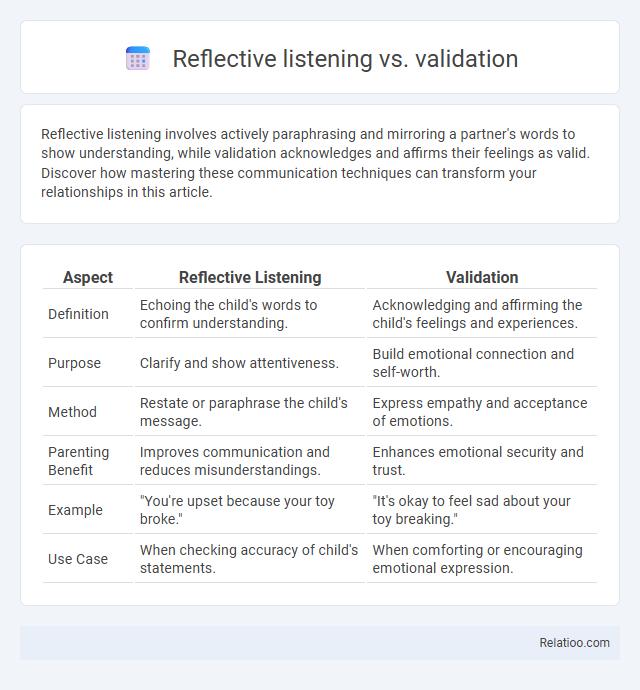Reflective listening involves actively paraphrasing and mirroring a partner's words to show understanding, while validation acknowledges and affirms their feelings as valid. Discover how mastering these communication techniques can transform your relationships in this article.
Table of Comparison
| Aspect | Reflective Listening | Validation |
|---|---|---|
| Definition | Echoing the child's words to confirm understanding. | Acknowledging and affirming the child's feelings and experiences. |
| Purpose | Clarify and show attentiveness. | Build emotional connection and self-worth. |
| Method | Restate or paraphrase the child's message. | Express empathy and acceptance of emotions. |
| Parenting Benefit | Improves communication and reduces misunderstandings. | Enhances emotional security and trust. |
| Example | "You're upset because your toy broke." | "It's okay to feel sad about your toy breaking." |
| Use Case | When checking accuracy of child's statements. | When comforting or encouraging emotional expression. |
Introduction to Reflective Listening and Validation
Reflective listening involves actively mirroring Your speaker's message to confirm understanding and foster clarity, while validation acknowledges and accepts their feelings or experiences without judgment. Both techniques are essential in effective communication; reflective listening emphasizes comprehension and empathy, whereas validation reinforces emotional acceptance. Employing these strategies together enhances trust and rapport in interpersonal interactions.
Defining Reflective Listening
Reflective listening is a communication technique where the listener actively mirrors the speaker's thoughts and feelings to confirm understanding and show empathy. Unlike validation, which acknowledges and accepts the speaker's emotions without necessarily mirroring them, reflective listening involves paraphrasing or summarizing the speaker's message to ensure clarity and connection. This method enhances trust and reduces misunderstandings by making the speaker feel heard and accurately understood.
Understanding Validation in Communication
Validation in communication affirms the feelings and perspectives of others, enhancing emotional connection and trust. Reflective listening involves actively paraphrasing or summarizing what someone has said to demonstrate understanding and clarify meaning. Your ability to distinguish between reflective listening and validation ensures more empathetic and effective interactions by both recognizing emotions and confirming comprehension.
Key Differences Between Reflective Listening and Validation
Reflective listening involves paraphrasing or summarizing what the speaker has said to show understanding and encourage further communication, emphasizing the listener's active engagement without necessarily confirming the speaker's feelings or experiences. Validation, on the other hand, explicitly acknowledges and accepts the speaker's emotions and perspectives as legitimate, fostering emotional support and connection by affirming their feelings. The key difference lies in reflective listening focusing on understanding content and meaning, while validation centers on recognizing and affirming the emotional experience behind the communication.
Psychological Benefits of Reflective Listening
Reflective listening involves actively restating and clarifying what the speaker has said, which enhances understanding and fosters emotional connection. Unlike validation, which acknowledges feelings as legitimate, reflective listening deepens empathy and reduces misunderstandings by ensuring you accurately grasp the speaker's message. Your use of reflective listening can lead to improved psychological well-being by promoting trust, reducing stress, and strengthening interpersonal relationships.
Emotional Impact of Validation
Validation acknowledges and accepts your emotions, creating a powerful emotional impact by making you feel heard and understood, which fosters trust and connection. Reflective listening mirrors your feelings and words, promoting clarity and empathy but may lack the deep emotional affirmation that validation provides. While both techniques enhance communication, validation uniquely supports emotional well-being by affirming your internal experiences as legitimate and meaningful.
Common Scenarios Using Reflective Listening
Reflective listening is often used in counseling and conflict resolution to ensure understanding by paraphrasing the speaker's message, while validation acknowledges the speaker's feelings as legitimate without necessarily repeating their words. Common scenarios using reflective listening include emotional support during difficult conversations, improving communication in relationships, and de-escalating tense situations. Your active use of reflective listening in these contexts fosters trust and clarity by showing genuine attentiveness to the speaker's emotions and perspectives.
Practical Techniques for Effective Validation
Practical techniques for effective validation emphasize acknowledging emotions and experiences without judgment, using statements like "I understand that you feel..." to mirror feelings accurately. Reflective listening involves paraphrasing the speaker's message to demonstrate understanding, while validation goes further by affirming the legitimacy of those feelings regardless of agreement. Combining reflective listening with validation fosters empathy and trust, essential for meaningful communication in counseling, conflict resolution, and interpersonal relationships.
When to Use Reflective Listening vs Validation
Reflective listening is best used when you want to ensure understanding by mirroring the speaker's emotions and content, helping them feel heard and clarified. Validation is effective when acknowledging the speaker's feelings as genuine and acceptable, even if you don't fully agree, reinforcing their emotional experience. Your use of reflective listening or validation depends on whether your goal is to deepen understanding or to affirm the speaker's emotional perspective.
Enhancing Relationships Through Both Skills
Reflective listening and validation are essential communication techniques that deepen understanding and trust in relationships by accurately interpreting and affirming your partner's feelings and experiences. Reflective listening involves paraphrasing and summarizing what is said to ensure clarity and show attentiveness, while validation acknowledges and accepts emotions as valid without judgment. Combining these skills enhances emotional connection and conflict resolution, fostering a safe environment where Your relationships can thrive.

Infographic: Reflective listening vs Validation
 relatioo.com
relatioo.com